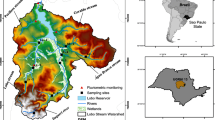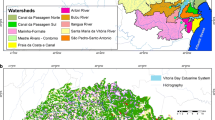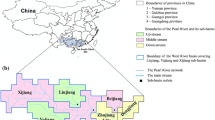Abstract
Because nutrient enrichment has become increasingly severe in the Tai Lake Basin of China, identifying sources and loads is crucial for watershed nutrient management. This paper develops an empirical framework to estimate nutrient release from five major sectors, which requires fewer input parameters and produces acceptable accuracy. Sectors included are industrial manufacturing, livestock breeding (industrial and family scale), crop agriculture, household consumption (urban and rural), and atmospheric deposition. Results show that in the basin (only the five sectors above), total nutrient loads of nitrogen (N) and phosphorus (P) into aquatic systems in 2008 were 33043.2 tons N a−1 and 5254.4 tons P a−1, and annual area-specific nutrient loads were 1.94 tons N km−2 and 0.31 tons P km−2. Household consumption was the major sector having the greatest impact (46 % in N load, 47 % in P load), whereas atmospheric deposition (18 %) and crop agriculture (15 %) sectors represented other significant proportions of N load. The load estimates also indicate that 32 % of total P came from the livestock breeding sector, making it the second largest phosphorus contributor. According to the nutrient pollution sectors, six best management practices are selected for cost-effectiveness analysis, and feasible options are recommended. Overall, biogas digester construction on industrial-scale farms is proven the most cost-effective, whereas the building of rural decentralized facilities is the best alternative under extreme financial constraint. However, the reduction potential, average monetary cost, and other factors such as risk tolerance of policy makers should all be considered in the actual decision-making process.






Similar content being viewed by others
References
Arnold JG, Srinivasan R, Muttiah RS, Williams JR (1998) Large area hydrologic modeling and assessment, part I: model development. JAWRA 34(1):73–88
Beasley DB, Huggins LF, Monke EJ (1980) ANSWERS: a model for watershed planning. Trans ASAE 23:938–944
Broad ST, Corkrey R (2011) Estimating annual generation rates of total P and total N for different land uses in Tasmania, Australia. J Environ Manag 92(6):1609–1617
Carpenter SR, Caraco NF, Correll DL, Howarth RW, Sharpley AN, Smith VH (1998) Nonpoint pollution of surface waters with phosphorus and nitrogen. Ecol Appl 8(3):559–568
Chen M, Chen J, Sun F (2008) Agricultural phosphorus flow and its environmental impacts in China. Sci Total Environ 405(1–3):140–152
Chen M, Chen J, Sun F (2010) Estimating nutrient releases from agriculture in China: an extended substance flow analysis framework and a modeling tool. Sci Total Environ 408(21):5123–5136
Chen Y (2010) Cost benefit analysis of nutrients pollution control in household consumption sector: a case of Changzhou, China (China). Nanjing University, Nanjing
Chen Y, Fan C, Teubner K, Dokulil M (2003) Changes of nutrients and phytoplankton chlorophyll-a in a large shallow lake, Taihu, China: an 8-year investigation. Hydrobiologia 506–509(1):273–279
Cherry KA, Shepherd M, Withers PJA, Mooney SJ (2008) Assessing the effectiveness of actions to mitigate nutrient loss from agriculture: a review of methods. Sci Total Environ 406(1–2):1–23
CZSB (2009) Changzhou municipal statistical yearbook (China). China Statistics Press, Changzhou
Ding XW, Shen ZY, Hong Q, Yang ZF, Wu X, Liu RM (2010) Development and test of the export coefficient model in the upper reach of the Yangtze River. J Hydrol 383(3–4):233–244
Donigian AS, Bicknell BR, Imhoff JC (1995) Hydrological simulation program—Fortran (HSPF). Computer models of watershed hydrology. WRP, Highlands Ranch
Drolc A, Koncan JZ (2002) Estimation of sources of total phosphorus in a river basin and assessment of alternatives for river pollution reduction. Environ Int 28(5):393–400
Ellis EC, Wang SM (1997) Sustainable traditional agriculture in the Tai Lake region of China. Agric Ecosyst Environ 61(2–3):177–193
Geng J, Niu X, Jin X, Wang X, Gu X, Edwards M, Glindemann D (2005) Simultaneous monitoring of phosphine and of phosphorus species in Taihu Lake sediments and phosphine emission from lake sediments. Biogeochemistry 76(2):283–298
Gunes K (2008) Point and nonpoint sources of nutrients to lakes—ecotechnological measures and mitigation methodologies—case study. Ecol Eng 34(2):116–126
Guo H, Zhu J, Wang X, Wu Z, Zhang Z (2004) Case study on nitrogen and phosphorus emissions from paddy field in Taihu region. Environ Geochem Health 26(2):209–219
He W, Yang H (2003) Analysis on processes of nitrogen and phosphorus removal for municipal sewage. J Huazhong Univ Sci Technol (Nat Sci Ed) 20(1):85–87
Hong B, Swaney DP, Howarth RW (2010) A toolbox for calculating net anthropogenic nitrogen inputs (NANI). Environ Model Softw 26(5):623–633
Jaworski NA, Groffman PM, Keller AA, Prager JC (1992) A watershed nitrogen and phosphorus balance—the upper Potomac River basin. Estuaries 15(1):83–95
Johnes PJ (1996) Evaluation and management of the impact of land use change on the nitrogen and phosphorus load delivered to surface waters: the export coefficient modelling approach. J Hydrol 183(3–4):323–349
JSEPD (2009) Environment quality bulletin of Jiangsu province in 2009 (China). http://www.jshb.gov.cn/jshbw/hbzl/ndhjzkgb/201006/t20100622_156746.html. Accessed 5 Dec 2010
JSPSCO (2008) Pollution sources census of Jiangsu province (China). China Statistics Press, Nanjing
JSSB (2010) Statistical yearbook of Jiangsu province (China). China Statistics Press, Nanjing
Kaushal SS, Groffman PM, Band LE, Elliott EM, Shields CA, Kendall C (2011) Tracking nonpoint source nitrogen pollution in human-impacted watersheds. Environ Sci Technol 45:8225–8232
Keller J, Subramaniam K, Gösswein J, Greenfield PF (1997) Nutrient removal from industrial wastewater using single tank sequencing batch reactors. Water Sci Technol 35(6):137–144
Kennedy C, Cuddihy J, Engel-Yan J (2007) The changing metabolism of cities. J Ind Ecol 11(2):43–59
Kivaisi AK (2001) The potential for constructed wetlands for wastewater treatment and reuse in developing countries: a review. Ecol Eng 16(4):545–560
Lai G, Yu G, Gui F (2006) Preliminary study on assessment of nutrient transport in the Taihu basin based on SWAT modeling. Sci China Ser D Earth Sci 49(supp 1):135–145
Li S, Yuan Z, Bi J, Wu H (2010) Anthropogenic phosphorus flow analysis of Hefei city, China. Sci Total Environ 408(23):5715–5722
Li Z, Yang G, Li H (2009) Estimated nutrient export loads based on improved export coefficient model in Xitiaoxi Watershed (China). Environ Sci 30(3):668–672
Liu J, Chen Y (2005) Biogas technology for control and prevention of multiple nonpoint source pollution in agriculture (China). China Biogas 23(4):40–42
Liu J, Diamond J (2005) China’s environment in a globalizing world: how China and the rest of the world affect each other. Nature 435(7046):1179–1186
Liu W, Qiu R (2007) Water eutrophication in China and the combating strategies. J Chem Technol Biotechnol 82(9):781–786
Liu Y, Chen JN, Mol APJ (2004) Evaluation of phosphorus flows in the Dianchi watershed, Southwest of China. Popul Environ 25(6):637–656
Nixon SW (1995) Coastal marine eutrophication: a definition, social causes, and future concerns. Ophelia 41(1):199–219
Paerl HW, Xu H, McCarthy MJ, Zhu G, Qin B, Li Y, Gardner WS (2011) Controlling harmful cyanobacterial blooms in a hyper-eutrophic lake (Lake Taihu, China): the need for a dual nutrient (N & P) management strategy. Water Res 45(5):1973–1983
Parsons JE, Thomas DL, Huffman RL (2001) Agricultural non-point source water quality models: their use and application. Southern Cooperative Series Bulletin #398, SAAESD
Puckett LJ (1994) Nonpoint and point sources of nitrogen in major watersheds of the United States. Water-resources investigations report 94-4001. U.S. Geological Survey, Reston, p 9
Qin B, Xu P, Wu Q, Luo L, Zhang Y (2007) Environmental issues of Lake Taihu, China. Hydrobiologia 581:12–14
Qin B, Zhu G, Gao G, Zhang Y, Li W, Paerl HW, Carmichael WW (2010) A drinking water crisis in Lake Taihu, China: linkage to climatic variability and lake management. Environ Manag 45:105–112
Qin B, Zhu G, Zhang L, Luo L, Gao G, Gu B (2006) Estimation of internal nutrient release in large shallow Lake Taihu, China. Sci China Ser D Earth Sci 49(0):38–50
Robertson GP, Vitousek PM (2009) Nitrogen in agriculture: balancing the cost of an essential resource. Annu Rev Environ Resour 34(1):97–125
Schindler DW, Vallentyne JR (2008) The Algal Bowl: overfertilization of the world’s freshwaters and estuaries. University of Alberta Press, Edmonton
Schulz R, Peall SKC (2001) Effectiveness of a constructed wetland for retention of nonpoint-source pesticide pollution in the Lourens River catchment, South Africa. Environ Sci Technol 35(2):422–426
Shen Z, Liao Q, Hong Q, Gong Y (2011) An overview of research on agricultural non-point source pollution modelling in China. Sep Purif Technol 84:104–111
Sloto RA, Crouse MY (1996) HYSEP: a computer program for stream flow hydrograph separation and analysis. Water-Resources Investigations Report 96-4040. U.S. Geological Survey, Lemoyne, p 53
Smil V (2000) Phosphorus in the environment: natural flows and human interferences. Annu Rev Energy Environ 25(1):53–88
SZSB (2009) Suzhou municipal statistics yearbook (China). China Statistics Press, Suzhou
Vitousek PM, Mooney HA, Lubchenco J, Melillo JM (1997) Human domination of earth’s ecosystems. Science 277(5325):494–499
Vollenweider RA (1982) Eutrophication of waters: monitoring, assessment and control. OECD, Paris
Wang H, Xi Y, Chen R, Xu X, Wei Q, Li J (2009a) Research of fertilizer and pesticides excessive application in Taihu Lake region (China). Agro Environ Dev 2009(26):3
Wang J, Xu Z, Peng X, Chen Z, Feng L, Li M (2009b) Experimental investigation of pollutants in human excreta (China). Res Environ Sci 22:1098–1102
Wang T (2007) Study on nitrogen and phosphorus losses from field used manure in Dianchi watershed by simulated rainfall method (China). The Graduate School of Chinese Academy of Agricultural Sciences, Beijing
Whitehead PG, Wilson EJ, Butterfield D (1998) A semi-distributed integrated nitrogen model for multiple source assessment in catchments (INCA): part I—model structure and process equations. Sci Total Environ 210(211):547–558
Wu S (2005) The spatial and temporal change of nitrogen and phosphorus produced by livestock and poultry & their effects on agricultural non-point pollution in China (China). Agricultural Resources and Regional Planning Institute, The Graduate School of Chinese Academy of Agricultural Sciences, Beijing
WXSB (2009) Wuxi municipal statistical yearbook (China). China Statistics Press, Wuxi
Xu H, Paerl HW, Qin B, Zhu G, Gao G (2010) Nitrogen and phosphorus inputs control phytoplankton growth in eutrophic Lake Taihu, China. Limnol Oceanogr 55(1):420–432
Xu J (2005) Phosphorus cycling and balance in “agriculture–animal husbandry–nutrition–environment” system of China (China). Agricultural University of Hebei, Baoding
Yan W, Yin C, Tang H (1998) Nutrient retention by multipond systems: mechanisms for the control of nonpoint source pollution. J Environ Qual 27(5):1009–1017
Yang L, Qin B, Hu W, Luo L, Song Y (2007) The atmospheric deposition of nitrogen and phosphorus nutrients in Taihu Lake (China). Oceanologia et Limnologia Sinica 38(2):104–110
Yang Q (1996) Algal bloom in Taihu Lake and its control (China). J Lake Sci 8(1):67–74
Yi W, Wang X, Wang A, Zhao H (2010) Discharge index of pollutants from village sewage in Taihu region—a case study in Kunshan (China). J Agro Environ Sci 29(7):1369–1373
Young RA, Onstad CA, Bosch DD, Anderson WP (1989) Agricultural non-point source pollution model for evaluating agricultural watersheds. J Soil Water Conserv 44(2):168–173
Zhai S, Yang L, Hu W (2009) Observations of atmospheric nitrogen and phosphorus deposition during the period of algal bloom formation in northern Lake Taihu, China. Environ Manag 44(3):542–551
Zhang J, Jørgensen SE (2005) Modelling of point and non-point nutrient loadings from a watershed. Environ Model Softw 20(5):561–574
Zhang L, Xia M, Zhang L, Wang C, Lu J (2008) Eutrophication status and control strategy of Taihu Lake. Front Environ Sci Eng China 2(3):280–290
Zhang Q, Chen Y, Jilani G, Shamsi IH, Yu Q (2010) Model AVSWAT apropos of simulating non-point source pollution in Taihu Lake basin. J Hazard Mater 174(1–3):824–830
Zhang Y (2008) Environmental economic assessment on best management practices in Taishitun town of Miyun county, Beijing (China). Capital Normal University, Beijing
Zhao GJ, Hormann G, Fohrer N, Li HP, Gao JF, Tian K (2011) Development and application of a nitrogen simulation model in a data scarce catchment in South China. Agric Water Manag 98(4):619–631
Zhou B (2001) Analysis on the operating cost of urban wastewater treatment plant in east China region (China). China Water Wastewater 17(8):29–30
Zhuang H, Cao W, Lu J (2002) Simulation of nitrogen release from decomposition of straw manure (China). Acta Ecologica Sinica 22(8):1358–1361
Acknowledgment
This research was supported by the National Science Foundation of China (Grant No. 70903030).
Author information
Authors and Affiliations
Corresponding author
Rights and permissions
About this article
Cite this article
Liu, B., Liu, H., Zhang, B. et al. Modeling Nutrient Release in the Tai Lake Basin of China: Source Identification and Policy Implications. Environmental Management 51, 724–737 (2013). https://doi.org/10.1007/s00267-012-9999-y
Received:
Accepted:
Published:
Issue Date:
DOI: https://doi.org/10.1007/s00267-012-9999-y




